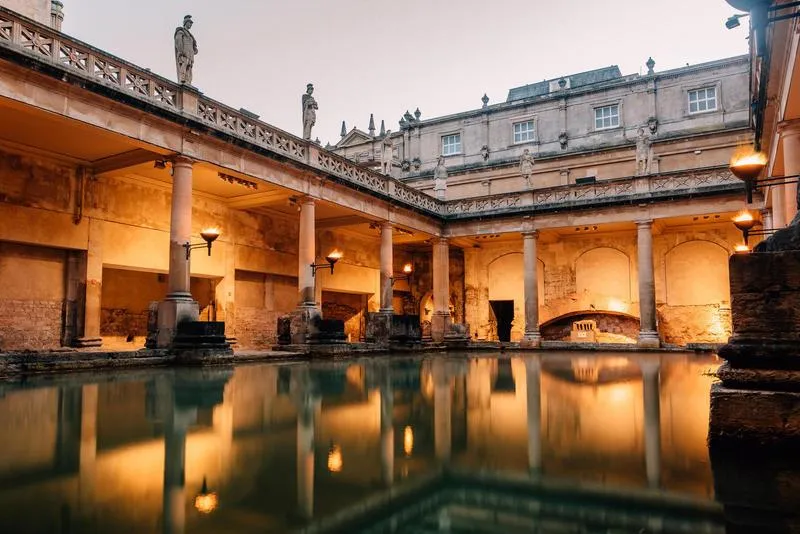2,000-Year-Old Sarcophagus Found in England Reveals Roman Burial Practices
A limestone coffin unearthed in Bath contains the remains of two individuals. Possible offerings to the gods were discovered nearby
:focal(3298x1931:3299x1932)/https://tf-cmsv2-smithsonianmag-media.s3.amazonaws.com/filer/13/8d/138d61fb-587d-4032-9cef-58ddf77266f0/sarcophagus_1_compressed.jpg)
Archaeologists in the city of Bath in southwest England have discovered an approximately 2,000-year-old Roman sarcophagus containing two bodies. The limestone coffin holds the preserved remains of one person in a prone position, with the partial remains of a second individual laid at their feet, the Bath Echo reports.
The north-facing orientation of the grave suggests it was a pagan burial. Nearby, researchers found a small pot containing food remains, as well as artifacts including small red and blue glass beads, possibly left as votive offerings. These types of donations to the gods were common in ancient Roman religion and represented a gift of thanks or payment, according to the Oxford Classical Dictionary.
“This is an amazing find,” says Sylvia Warman, science advisor for Historic England, in a statement. “Although several Roman stone coffins have been found around Bath in the past, none have been excavated and recorded by professional archaeologists using modern methods until today.”
Jesse Holth of ARTnews reports that the grave was buried beneath the grounds of Sydney Gardens, a Georgian pleasure garden once frequented by Jane Austen. Workers renovating and landscaping the garden for the Bath & North East Somerset Council’s Sydney Gardens Project discovered a Roman wall at the border of Bathwick Cemetery. When a team from L-P Archaeology excavated the site, they found the newly revealed burial. The archaeologists also uncovered cremated remains—the only known example of a cremation burial at the cemetery.
“Having a human skeleton directly associated with a coffin is a rarity,” says Kelly Madigan, a partner at L-P Archaeology, in the statement, “and to have this one associated with a probable votive offering and nearby human cremation allows a very rare glimpse into funerary practices in the region almost two millennia ago.”

Madigan says the firm is conducting lab tests to learn more about the burial, with the goal of discovering information about the identities of the deceased, their origins and their health.
A Unesco World Heritage site, Bath takes its name from an ancient spa built by the Romans in the first century A.D. The bath complex took advantage of the area’s natural hot springs and included changing rooms, saunas and an enormous heated Great Bath. It remains largely intact below the street level of the modern city. Another highlight of the area’s Roman past is the Temple of Sulis Minerva, where worshippers made sacrifices to the goddess of wisdom and war.
Much later, in the 18th century, developers built on the city’s continuing use as a spa resort, erecting large Neoclassical buildings and earning Bath a reputation as one of Europe’s most beautiful cities.
Last year, archaeologists discovered a set of 50 Roman-era burials in Somerton, about 30 miles southwest of Bath, as Steven Morris reported for the Guardian at the time. The graves reflected the gradual adoption of Roman burial practices in southern Britain.
The Ministry of Justice granted researchers at the Bath site a license to handle the newly discovered human remains, which must be reburied in a certified burial ground by 2026. That gives the team time to conduct analysis of the bodies. Once testing is complete, the empty coffin may be displayed at the Temple of Minerva, according to BBC News.
Meanwhile, the Sydney Gardens Project is continuing to restore historic buildings and create new landscape and garden attractions. The project, funded by the National Lottery Heritage Fund and Bath & North East Somerset Council, is scheduled to wrap up in March 2022.
/https://tf-cmsv2-smithsonianmag-media.s3.amazonaws.com/accounts/headshot/Livia_lg_thumbnail.png)
/https://tf-cmsv2-smithsonianmag-media.s3.amazonaws.com/accounts/headshot/Livia_lg_thumbnail.png)